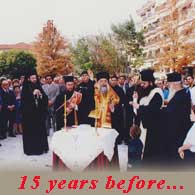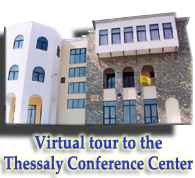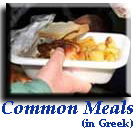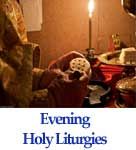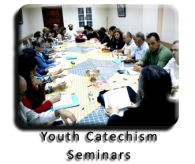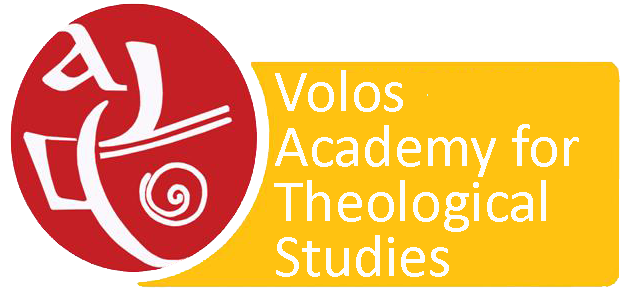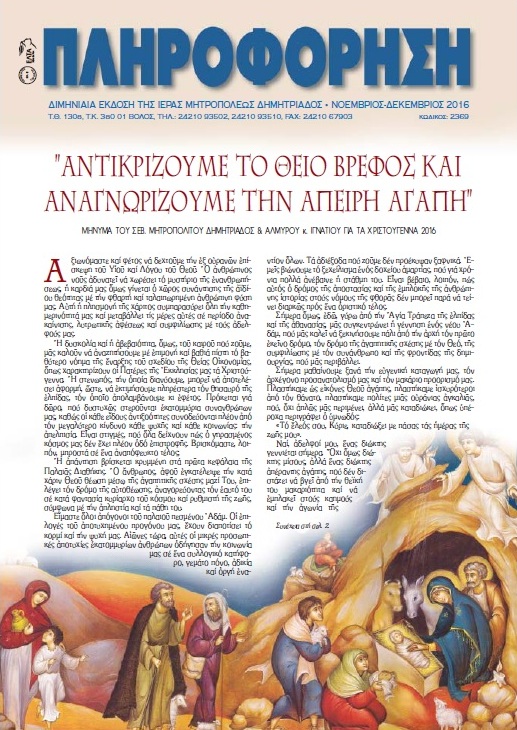Press Release “Can Orthodox Theology Be Contextual? Concrete Approaches from the Orthodox Tradition”
International conference "Can Orthodox Theology Be Contextual? Concrete Approaches from the Orthodox Tradition"
(Cluj, Romania, May 23-26, 2013)
On May 23, 2013, the international conference "Can Orthodox Theology Be Contextual? Concrete Approaches from the Orthodox Tradition" started in Cluj-Napoca, Romania. Prominent Orthodox scholars from all over the world have gathered at this time to discuss the challenge of contextuality while considering the potential of the patristic heritage for the future of Orthodox theology. The conference has been organized by the Volos Academy for Theological Studies in co-operation with the Romanian Institute for Inter-Orthodox, Inter-Confessional and Inter-Religious Studies (INTER, Cluj-Napoca, Romania), the Orthodox Christian Studies Center of Fordham University (USA), the Chair of Orthodox Theology at Münster University (Germany), the Christian Cultural Center of Belgrade/Institute for the Study of Culture and Christianity (Belgrade, Serbia), the St Andrew's Biblical Theological Institute (Moscow), and the European Forum of the Orthodox Schools of Theology (EFOST, Brussels), with the support of the Orthodox Metropolis of Cluj, and the Faculty of Orthodox Theology of Babes-Bolyai University (Cluj-Napoca, Romania).
Representing the host institute, the University of Babes-Bolyai (UBB), its vice-rector, Prof. Dr. Mihaela Lutas, welcomed the participants and pointed out the importance of this theological event. With its four theological faculties (Orthodox, Roman-Catholic, Greek-Catholic, Protestant), UBB offers one of the broadest theological faculties in Europe. The President of the UBB Senate, Rev. Prof. Dr. Ioan Chirila, also underlined the relevance of the conference theme and its pan-Orthodox importance. During his welcome address, His Eminence Metropolitan Andreas of Cluj meditated on the theological and pastoral significance of contextuality, pointing out that if the Church is not contextual, then it is not faithful to Jesus Christ, who "is the same yesterday, today and forever" (Heb. 13:8). Dr. Radu Preda (Director, Romanian Institute for Inter-Orthodox, Inter-Confessional and Inter-Religious Studies [INTER], Associate Professor of Social Theology, Faculty of Orthodox Theology, UBB, Cluj-Napoca, Romania,) offered a brief introduction to the theme of the conference, remarking that "Orthodoxy has a message, but is still missing the language. In order to learn it, Orthodoxy has to realize profoundly the problematics and expectations of modernity".
At the first session of the conference, Rev. Dr. Igumen Calinic Berger, Priest of the Romanian Orthodox Diocese of America (Pennsylvania, USA), delivered a paper on "Contextual Theology, the 'Patristic Mind', and the Triadology of Father Dumitru Staniloae." He distinguished between 'contextual' as an aspect of the historical-critical study of patristic texts, and 'contextual' as an effort of theology to express the truths of the Christian faith in a way meaningful to specific social, linguistic, or cultural circumstances, noting that the challenge of Orthodox theology is to both assimilate patristic knowledge and apply it in a vibrant and transformative way to the existential state of the contemporary world. Fr. Berger elaborated on three components that might be included in any conception of 'the mind of the Fathers': the need for the living experience of God (both cataphatic and apophatic), an approach to tradition as creativity in continuity, and the centrality of the Holy Scriptures in devotion and theological thought. He examined Fr. Staniloae's theological methodology as employed in his triadology as an example of his neopatristic synthesis.
Dr. Aristotle Papanicolaou, Professor of Theology and Co-Founding Director of the Orthodox Christian Studies Center (Fordham University, New York, USA) spoke on "Personhood, Virtue and War". He developed an Orthodox theology of personhood relating it to St. Maximus the Confessor's understanding of virtue as learning how to love and demonstrated the relevancy of this theology of personhood in relation to the ethics of war.
During the second day (May, 24), Deacon Dr. Paul Gavrilyuk (Department of Theology, University of St. Thomas Minnesota, USA) examined "The Epistemological Contours of Florovsky's Neopatristic Theology", exploring the epistemological insights scattered through Georges Florovsky's theological corpus. He systematized Florovsky's account of theological norms and sources, including divine relevation, ecclesial experience, scripture and tradition. According to Gavrilyuk's opinion, Florovsky's epistemological reflections were much stimulated by Alexei Khomiakov. He proposed that Florovsky's account of religious knowledge was a form of social epistemology, which could be described as 'the ecclesial epistemology of catholic transformation'.
Rev. Dr. Radu Bordeianu (Associate Professor, Duquesne University, President of the Orthodox Theological Society in America [OTSA], Pennsylvania, USA) delivered a paper entitled "The Holy Spirit Makes the Church Contextual. Diversity and Unity, Charisms and Institution, Already Here but Not Yet". He asserts that at the intersection of Pneumatology and Ecclesiology, Orthodox theology can be contextual. After exploring the positions of Lossky, Nissiotis, Zizioulas, Florovsky, Evdokimov, Afanassieff and Staniloae, and after having pointed out their differences, he shows that they were all concerned with maintaining both the unity of the Church and its diversity. Most of these theologians ascribed the diversifying role to the Spirit who responds to the needs of the Church in different contexts. The contextuality of the Church is manifested in the multiplicity of persons making it up, the diverse ministries and gifts, as well as the relationship between charisms and institution. According to Bordeianu, the Spirit permeates all these aspects of the life of the Church, making the Church contextual, while also maintaining its identity through the centuries, in various places.
Dr. John Fotopoulos (Associate Professor, Saint Mary's College, Notre Dame, USA) spoke on the theme: "'Let us Exercise in the Field of Scripture': The Correspondence between Jerome and Augustine of Hippo for Issues in Contemporary Orthodox Biblical Scholarship". Fotopoulos surveyed the contentious long distance correspondence between Jerome and Augustine during the late 4th and early 5th centuries AD and their debate over issues of biblical studies such as textual criticism, translation, exegesis, and hermeneutics. Prof. Fotopoulos showed how the biblical scholarship of Jerome and Augustine is relevant to both Orthodox biblical scholarship and to Orthodox Christianity, while also pointing out ways that contemporary biblical scholarship has moved forward since the time of these two Fathers. He argued that it is not sufficient for Orthodox Christians to simply repeat the exegesis of Augustine, Jerome, or any other Church Father, but rather to learn from the Fathers while also using the scholarly tools available today so as to interpret the Scriptures effectively within the contemporary situation.
Dr. Spyridoula Athanassopoulou-Kypriou, Lecturer at the Hellenic Open University (Athens, Greece), delivered a paper on "The Eschatological Body: Constructing Christian Orthodox Anthropology Beyond Sexual Identity". She specifically discussed the question: "How can Orthodox theological discourse respond to contemporary challenges of sexual difference and of naturalized and compulsory heterosexuality without regressing to gender essentialism, sexism and patriarchal homophobia?" She explored the liberating resources of Eastern Orthodox tradition, further arguing that the Patristic thought and Orthodox theology may contribute both to the spiritual aspirations of all those discriminated against, and to the contemporary discourse about sexuality. She presented Gregory of Nyssa's eschatologically oriented theory of gender and concluded with a brief discussion on the different ways that Orthodox theological discourse can contribute to contemporary debates on issues of gender and sexuality, personal transformation and social justice.
Dr. Rasko Jovic (Associate, Educational Institute at the Theological Faculty in Belgrade, Religious Teacher at the Secondary Education, Serbia) developed the problematic of a "Theology with a Human Face", reflecting on the contextuality of Orthodox theology and offering examples from the communist era. Criticizing theology which avoids confrontation with the problems of the present as docetic, he accentuated the importance of a serious understanding of history. In his opinion, liberation theology is related to the devastating economic situation in Latin America and Africa, and therefore it is not sufficient for a confrontation with problems in other historical contexts. Nevertheless, theology with human face is necessary as an approach of people living today, as care for the salvation of humankind in the present. The message of the Church depends on its capability to free itself from structures that reflect feudal society instead of the Kingdom of God. Without internal liberation, the Church will not be able to generate theology which could be regarded as credible by the modern people.
Dr. Michael Hjälm (Dean of Sankt Ignatios Theological Academy, Södertälje, Sweden and Theological Secretary, Diocese of Helsinki, Orthodox Church in Finland) spoke on "The Role of the Church in Financial Crises. On the Relation between Moral Prejudices, Commodities and Reification", analyzing the development of social and financial structures in modernity, considering the fact that the Church is associated with a pre-modern world with a focus on holistic worldviews. Such is precisely the opposite of rationalization as differentiation. This creates an environment that decreases the progression of rationalization with the effect of separating instead of differentiating between moral and social issues vis-à-vis subsystems that includes commodity forms. Based upon an understanding of rationalization as differentiation, he argued that the economic crisis in southeastern Europe, and especially in Greece, has cultural and ecclesial roots that challenge the self-understanding of the Church, and the practice of the Church in relation to the society.
Rev. Dr. Zosim-Dorin Oancea (Professor of Philosophy of Religion, Sibiu University, Romania) examined the topic "Communion With God in the World. The Environmental Crisis as a Challenge to Orthodox Self-Understanding". He insisted that contextuality is related to the environment by asking to which extent the connection between humankind's spiritual life and humankind's natural and social environment is legitimate or not. According to the Orthodox tradition as expressed, e.g., in the liturgical life of the Church, the communion with God in the framework of nature is constitutive for all people in all times. Having remembered some significant moments of ecological involvement in the recent history of the Orthodox Church, Fr. Oancea explained theological contextualization in terms of actualizing, when needed, certain possibilities given in the Tradition and liturgical experience of the Church.
Prof. Dr. Assaad Elias Kattan (Chair of Orthodox Theology, Münster University, Germany) spoke on "The Cross as 'Islam'- Georges Khodr's Approach as a Paradigm of Contextual Theology". Among the manifold theological topics addressed by Georges Khodr (1923-), today the Orthodox Metropolitan of Mount Lebanon and one of the most influential Christian theologians in the Arab World, Islam occupies a privileged place. Khodr's approach to this religion, with which the Oriental Christians have been confronted since the 7th century, not only calls for theological innovativeness, but also reveals the intimate link between good theology and context. Kattan explored the major features of this approach, focusing on its contextual dimension. He devoted special attention to Khodr's understanding of Jesus crucified as realizing the very nature of 'Islam'.
Ass. Prof. Dr. Radu Preda spoke on "Human Rights as an Example of Contextual Theology". He remarked that not only Orthodoxy, but also all the other Christian denominations, had a difficult way to go before accepting human rights. His main thesis was that human rights must experience a dual contextualization: first, the Christian values, especially the biblical anthropology, in the context of human rights; second, we need to find new ways to these values. This is a process of "contextualization of the context".
At the first session of the day (May 25th) Rev. Hilarion Reznichenko, MA, St Petersburg Orthodox Theological Academy (Russian Federation), spoke on "Science and Religion: Compatibility and Balance", considering the relationship of science to religion as one of the most crucial challenges of contemporary Orthodox apologetics. He argued for the possibility of mutual coexistence of science and religion as two different but not contradictory ways of world perception and knowledge. According to Fr. Reznichenko, neither the tendency to mix science and religion, nor their total separation, are valid approaches. Although their dialogue experienced not only positive, but also negative phases, common points of interaction become obvious under specific epistemological conditions. Fr. Reznichenko noted that contemporary theology would become non-viable without appropriate access to achievements of natural science and humanities. On the other side, science could be turned into scientism or into a sort of ideology, if it doesn't show similar openness.
Rev. Dr. Grigorios Papathomas, Professor, School of Theology, Athens University (Greece), and Institute of St. Sergius, Paris (France), President of the European Forum of Orthodox Schools of Theology (EFOST), Brussels (Belgium), spoke on "Canon Law. Today Relevance of the Canons". He argued that the essential and necessary distinction between truth and historical contextuality is a primary criterion and conditio sine qua non for the study of the main question of contextuality in the history of the Church. Contextuality does not precede truth, but follows it hypostatically and structurally (the principle of the priority to the Holy Canons). Truth is of primary importance in a canon, while contextuality is of secondary importance, thus precluding any notion of substantive equality between them (the principle of diachronicity of the Holy Canons). Contextuality is relativized, and its ontological power is limited by the fact that the canons 'consider' by definition eschatological realities (the principle of iconism of the Holy Canons). Therefore Fr. Papathomas noted that the Church's canons clearly have an ontological content, insisting that although their historical contextuality may be an unavoidable aspect of their consideration, it does not belittle their ontology.
During the second session Dr. Haralambos Ventis (Academic team of Volos Academy for Theological Studies, Volos, Greece) examined the problematic of "Theology and History" from an Orthodox point of view. Having emphasized the aspects of the Christian doctrine that impose a thoroughly positive attitude towards history (e.g. the Incarnation), Ventis criticized introvert tensions in the Church, which mirror a remoteness and noticeable aloofness with regard to history, an underestimation of politics or of the challenges of modernity. According to him, theology is charged with the prerogative of relativizing historical periods and cultures, of destroying illusions of historical determinism, of identifying and confronting injustices and various forms of barbarism, and upholding the open nature of the future, which is shaped by God the Holy Spirit who freely blows where he wills (John 3:8).
Dionysios Skliris (MA in Late Antiquity Studies [King's College, London] and Byzantine Studies [Université Paris IV, Sorbonne], Athens, Greece), delivered a paper entitled "The Maximian Dialectic between Logos (Reason), Tropos (Mode) and Telos (Goal) in a Post-modern Context and its Importance for a Theological Evaluation of Race and Nationalism". According to Skliris the dialectic between the terms logos (reason), tropos (mode) and telos (goal) in St Maximus the Confessor (c. 580-662) could be re-actualized as a peculiar "theology of dialogue". Such a theology could enter itself into dialogue with the context of (late) post-modernity, as well as with specific currents of thought such as Post-hegelian dialectical philosophy, a certain anti-essentialism proper to the era after the linguistic turn in philosophy and the relative contribution of post-structuralism, Lacanian and post-Lacanian psychoanalytic thought, phenomenology e.a. Skliris presented an application of such a "theology of dialogue" (which also incorporates other currents of the Orthodox tradition, such as the Cappadocian Trinitarian theology, the anthropology of Gregory of Nyssa, the Antiochian emphasis on historicity, the Alexandrian tradition e.a.) to the subject of race and nation. His approach was based on a neo-Chalcedonian logic that divisions are called to become distinctions-in-dialogue, and searched for a third alternative to the dilemma between nationalism and abstract universalism.
At the first afternoon session Associate Professor Dr. Crina Gschwandtner (Fordham University, New York, USA) examined the relationship between "Philosophy and Theology", arguing that philosophy serves an important function in the Orthodox tradition and can enable contemporary Orthodox theology to deal with the context of the postmodern world, in which we find ourselves today. She suggested that contemporary French philosophy, especially hermeneutics and phenomenology, provide important tools for theological thinking and shows how they might be appropriated in productive fashion by Orthodox thought today.
Dr. Vasilios Makrides, Professor of the Sociology of Orthodox Christianity (Erfurt University, Germany) delivered a paper on "Orthodox Christianity and Social Sciences: Sociology, Social Anthropology, Political Science". According to him, the Church has always dealt, in one way or another, with social issues (e.g., poverty, injustice) and developed its philanthropic activities; there is also plenty of theological reflection about social issues from an Orthodox point of view across history. In addition, social criticism is not lacking from the related Orthodox discourses. On the other hand, one may locate several differences between the Orthodox East and the Latin West in dealing with social issues, especially in modern times; e.g., the Orthodox East generally lacks the systematization of the Church's positions in the form of a "social doctrine" which characterizes the Latin West. Makrides noted also that the modern social sciences have developed independently of religious objectives and enjoy today a fully autonomous status within academia. Nevertheless, the results of their research were considered in many cases useful for the practical work of the Church and have been incorporated into disciplines such as "Christian sociology". Makrides addressed this broad issue by taking into consideration the specific Orthodox case by exploring the ways in which Orthodox theology may start a fruitful dialogue with modern social sciences and discussing some caveats that the Orthodox should bear in mind.
At the last session Dr. Davor Dzalto, Professor at Niss University, President of the Institute for the Study of Culture and Christianity (Belgrade, Serbia) examined the theme: "Orthodoxy and Contemporary Art: An (Un)Natural Alliance?", arguing that religion occupies a "strange place" in contemporary art. The same can be said for the place of contemporary art in religion, especially in Orthodox theology. He inquired why modern/contemporary art and religion went separate ways in the history of (post) modernity, and explored if Orthodox theology and modern/contemporary art can learn from each other and how. In order to explore their potential relations and points of mutual benefit Dzalto analyzed a couple of concepts that are basic both for Orthodox theology (especially Orthodox anthropology) and for some of the major manifestations of modern/contemporary art: creation/creativity, freedom and the communitarian dimension of human (artistic) experience and existence.
Dr. Pantelis Kalaitzidis, Lecturer at the Hellenic Open University (Thessaloniki, Greece), Visiting Professor at St Sergius Institute (Paris, France), Visiting Research Fellow at Princeton University (New Jersey, USA), Director of Volos Academy for Theological Studies (Volos, Greece), spoke on "Theology and Literature: The Case of Nicolae Steinhardt". He argued that Church and theology-especially since the patristic era-seem to always need the mediation of philosophy, particularly the ontological version, in their relationship and dialogue with the world. In our rapidly changing world, says Dr. Kalaitzidis, in which the mediating role of ontological philosophy has not been any more self-evident, the question is which discipline can assume this role and serve as mediator between theology and secular thought, translating into today's contextual language and models the eternal truths and values of the Christian Gospel. In his paper, Kalaitzidis explored the possibilities, using as a kind of case study the dialogue between theology and modern literature, the latter claiming a non-theological understanding of universality and providing the former with the contextual language and schemes with which theology could communicate its message to the people of postmodernity, and thereby cease to address today's issues in a dated and self-referential language. Modern literature, and especially the modern novel, the literary genre par excellence of modernity, seems to be the "philosophy" and "theology" of the individual, the "gospel" of the religiously liberated secular world of modernity. This is why literature represents a cosmology and anthropology similar, but different, from theology. Modern literature represents a non-theological discourse of universality, a discourse which, beyond the piecemeal ontological language of philosophy, attempts to provide, through poetry, narrative, and the use of literary myth, allusive and polysemic - and yet more inclusive and universal-answers to the great questions of the world and of human beings. Narrative discourse, for its part, claims to answer questions that philosophy has seemingly failed to answer, such as the fundamental question-from Plotinus and Augustine to Heidegger-"what is time?" Kalaitzidis presented the case of the Romanian monk and author Nicolae Steinhardt-the "patriarch of Romanian literature," and a prominent figure in European letters according to many critics- as a very characteristic example of what kind of challenges and possibilities modern literature represents for theology.
At the end of the conference ecumenical observers, who participated in it thanks to a generous offer of the Program on Ecumenical Theological Education of the World Council of Churches (ETE/WCC), where asked to offer their remarks and comments on its thematic.
Dr. Stefan Tobler, Professor, Faculty of Protestant Theology, University of Sibiu (Romania), stressed the importance of the methodological question of contextuality. According to his opinion, the different approaches from Protestant and Orthodox scholars are mostly of cultural and not theological nature. He emphasized the challenge of mission for a fruitful contribution to the issue of contextuality and criticized mistakes western Churches have done concerning the evangelization in not-western cultural frameworks. He also commented on various current theological challenges (hermeneutics, the role of women in the Church, etc.).
Dr. Ingeborg Gabriel, Professor for Social Ethics, Faculty of Catholic Theology, University of Vienna (Austria), emphasized the importance of the conference held in Cluj. She regarded Apostle Paul as the first contextual theologian, remarking that the theologies of the Fathers and of the Scholastics were contextual, too. Commenting on the thematic of the conference, she referred to similar discussions and currents in the Roman Catholic Church in the previous century (e.g. nouvelle théologie) which wanted to profit from the treasure of the tradition in order to face the problems of the modern world. In spite of the confessional differences, there is much common ground and many common problems and these are to be faced in an ecumenical perspective. New theological contributions are expected, among others, in issues of economics, technology or in social matters. At this point Prof. Gabriel mentioned the common ecumenical initiatives in Austria concerning social work and emphasized the role of the late Metropolitan Michael Staikos (Ecumenical Patriarchate) in these efforts. She also insisted that every theology is contextual, arguing that the challenge is either to be actively or passively contextual.
Dr. Graham Ward, Regius Professor of Divinity, Oxford University (United Kingdom), priest of the Church of England, referred to the current crisis within Anglicanism concerning the ordination of women or the attitude towards gay couples, etc. He referred to important cultural changes mirrored in the broad use of terms like post-secular or de-secularization, in the critic of secularism as a form of an oppressive ideology or in new appreciations of the sacramental and the spiritual. Prof. Ward criticized theological approaches based on essentialistic metaphysics and stressed the importance of ecumenism regarding the discussion on contextuality, telling that the Orthodox are not alone in their theological enterprises or in their considerations on the relationship between ecclesiology, nationality and transnationality. According to Ward, it is crucial to recognize that we Christians do not need to be apologetic any more and that we should stop being afraid of contestation.
At the end of the conference, on behalf of the organizers Prof. Radu Preda and Dr. Pantelis Kalaitzidis thanked the participants, the staff and the sponsors for their precious contributions to the success of this demanding conference.
On Sunday, May 26th, the participants attended the Holy Liturgy at the Orthodox Cathedral of Cluj, devoted to the Dormition of the Theotokos. They also participated in the Vespers, which has been celebrated by H.E. Andreas, Metropolitan of Cluj. His Eminence offered a closing dinner in honour of the participants, thanking for their contributions in this conference, whose thematic is of great actuality and importance.
The conference proceedings were broadcast live from the Radio Station "Radio Renasterea" of the Orthodox Metropolis of Cluj, while also being sponsored by the State Secretariat for Religious Denominations of the Romanian Government, the Country Council of the City of Cluj (Consiliul Judetean Cluj), the Mayor Institution and Local Council of Cluj-Napoca (Primaria Consiliul Local Cluj-Napoca), the Bank of Transilvania (Banca Transilvania), the Program on Ecumenical Theological Education of the World Council of Churches (ETE/ETE), and the companies Skoda Compexit and Fany and Daisler Print House.










